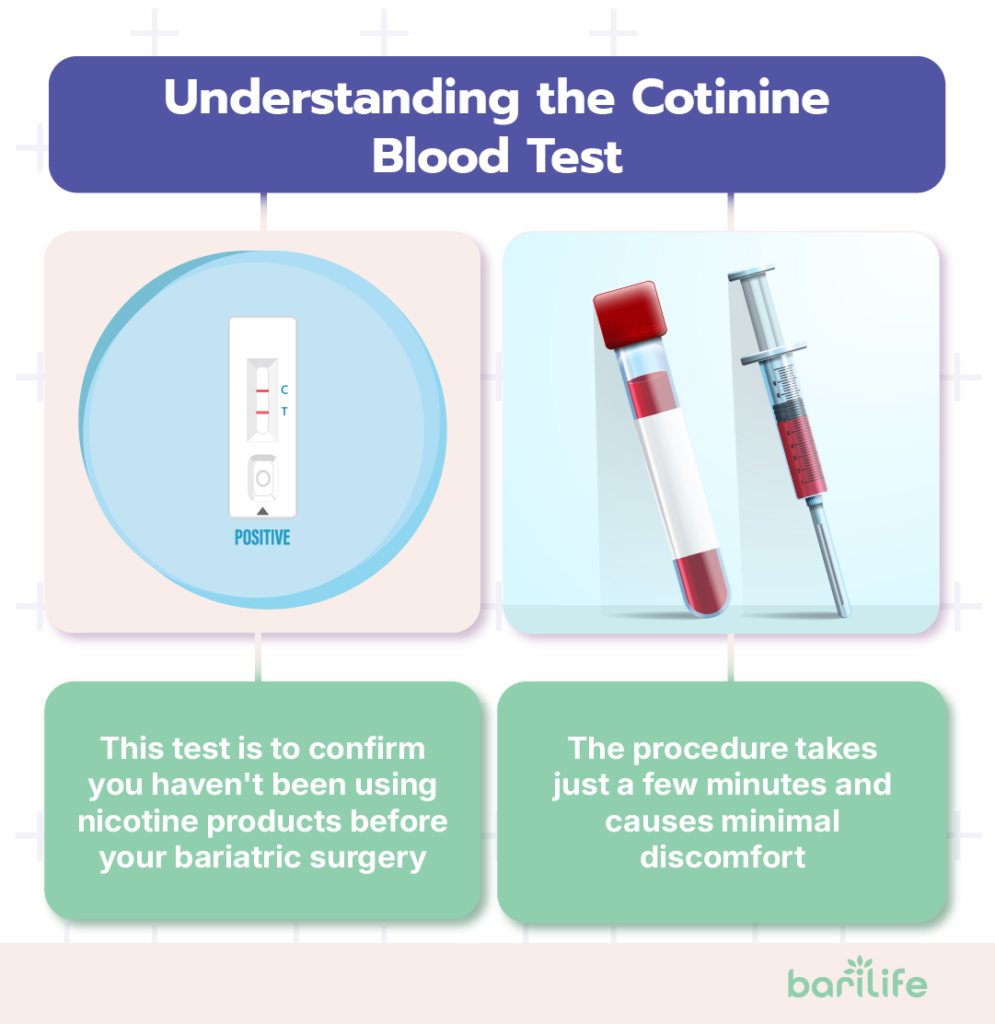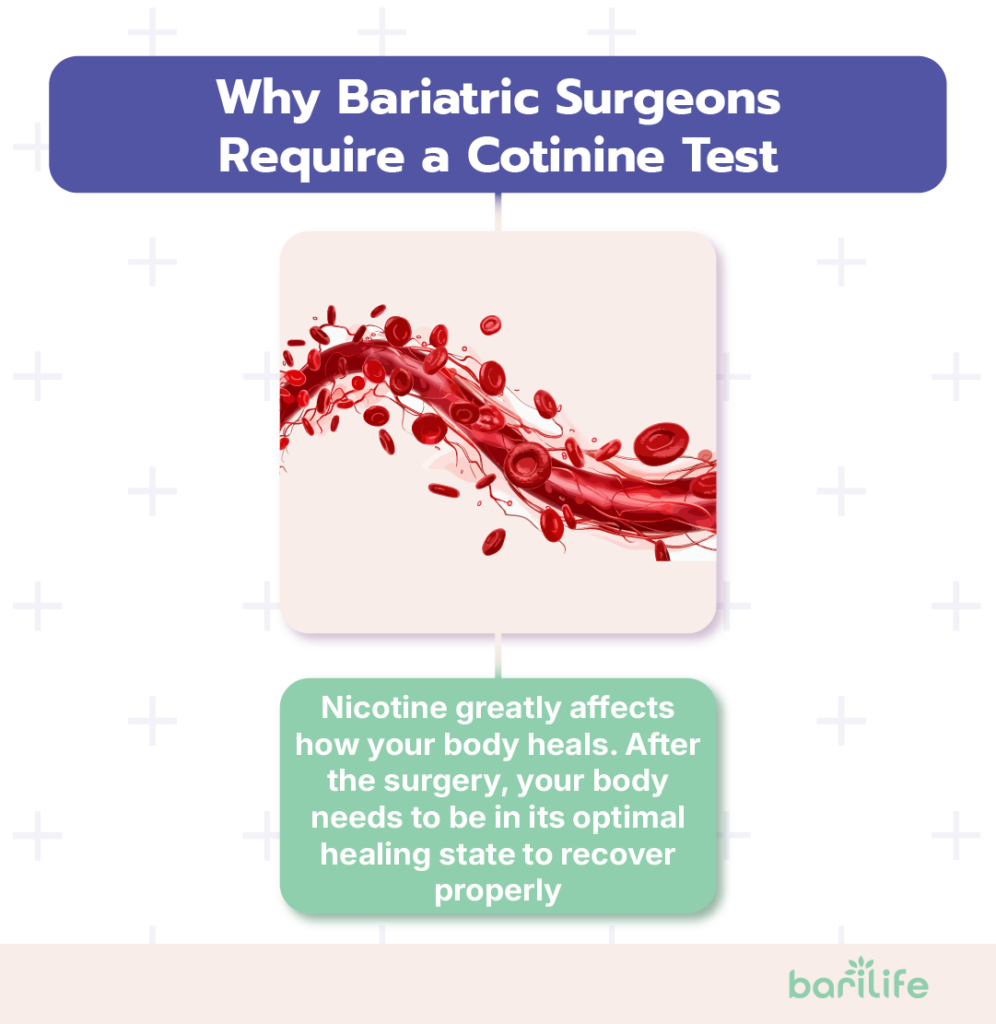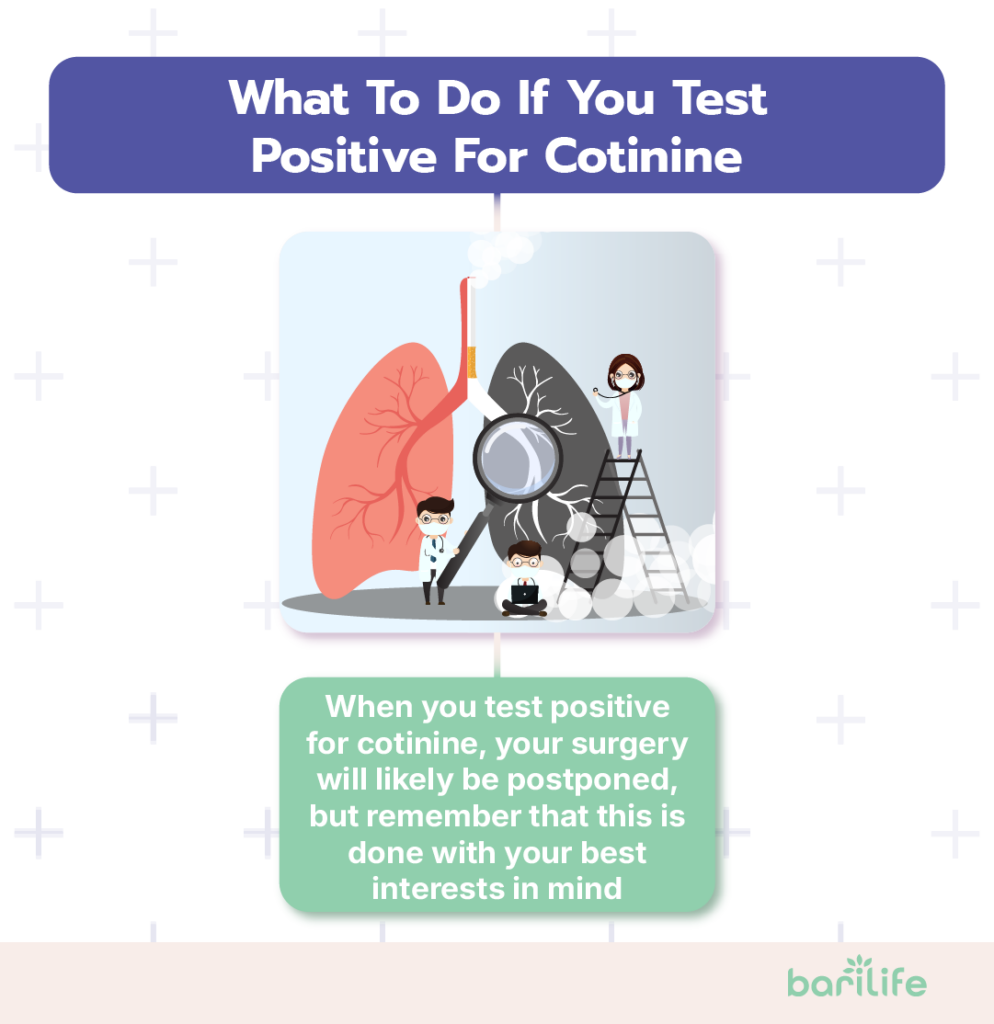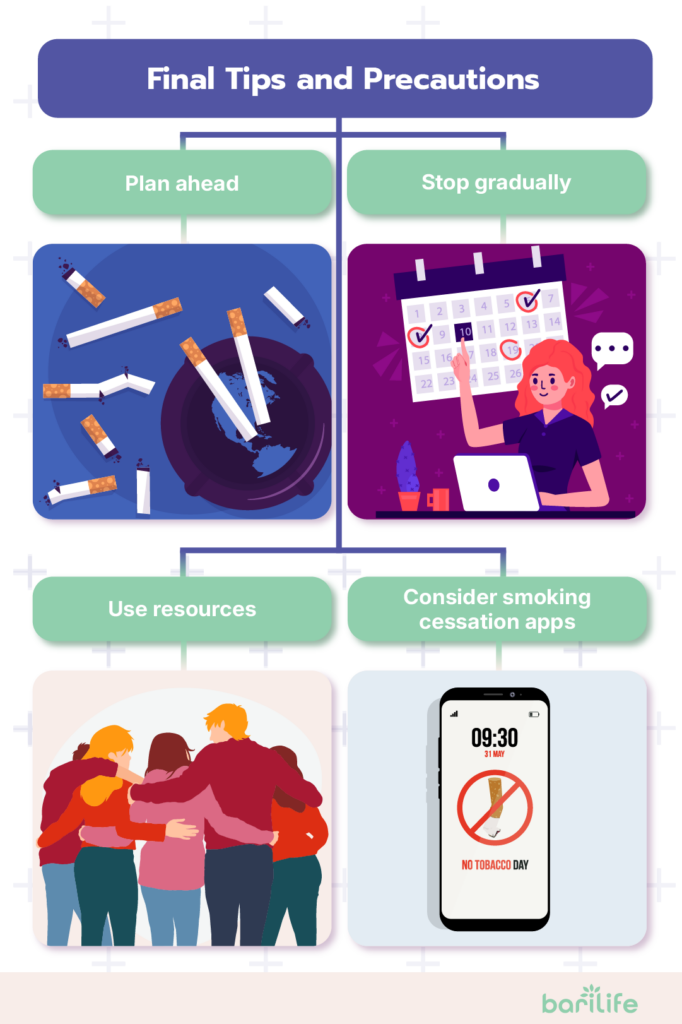Key Takeaways
- The cotinine blood test detects nicotine use and is a critical requirement for bariatric surgery, ensuring safer recovery and reducing complications.
- Nicotine can severely impair healing and increase the risk of surgical complications, making it essential to quit all nicotine products at least two weeks before the test.
- Support systems like hydration, exercise, stress management, and smoking cessation resources can significantly improve your chances of successfully stopping smoking.
Getting ready for weight loss surgery? Then you need to know about the cotinine blood test. This test checks if you’ve been using nicotine products, and it can make or break whether your surgery happens on schedule. For many bariatric patients who smoke or recently quit, this test becomes a major hurdle.
But don’t worry, with the right information and a solid plan, you can pass this test. In fact, it’s important that you do. Nicotine can slow down surgical healing and puts you at risk for other complications. For your safety and benefit, stopping smoking before bariatric surgery is imperative.
This guide will show you exactly what you need to know about cotinine testing and give you practical steps to ensure you pass it successfully.
Table of Contents
Understanding the Cotinine Blood Test

When your bariatric surgeon orders a cotinine blood test, they’re looking for evidence of recent nicotine exposure in your system. But what exactly is cotinine, and why does it matter?
Cotinine is the primary chemical substance produced when your body breaks down nicotine. Unlike nicotine, which has a relatively short half-life in the body, cotinine remains detectable for a much longer period.
This makes it an ideal biomarker for healthcare providers to check whether you’ve been exposed to nicotine recently.
The purpose of the test is straightforward: to confirm you haven’t been using nicotine products before your bariatric surgery. The test is very sensitive and can find trace amounts of cotinine in your bloodstream.
It can pick up exposure from cigarettes, e-cigarettes, nicotine patches, gums, and even significant secondhand smoke.
The detection window for cotinine in blood tests typically extends up to 10 days after your last nicotine exposure, so this gives your medical team reliable information about your recent nicotine use.
You can expect a standard blood draw similar to other pre-surgical blood work during the actual test. The phlebotomist typically draws blood from a vein in your arm using a small needle.
The procedure takes just a few minutes and causes minimal discomfort. Results are usually available within 1-3 days and will be communicated to you by your surgical team during a follow-up appointment or phone call.
Why Bariatric Surgeons Require a Cotinine Test
You might wonder why your surgeon is so concerned about nicotine use before surgery. It’s mostly for safety reasons.
First, nicotine greatly affects how your body heals. After the surgery, your body needs to be in its optimal healing state to recover properly.
Nicotine makes your blood vessels smaller, which means less blood flows to surgical sites. This slows down healing and could lead to infections or, worse, leaking at surgical connection points.

Research suggests that people who smoke within the 12 months before surgery have a significantly higher risk of developing a post-surgical leak.
Another important concern is how nicotine affects your lungs and increases risks during anesthesia. Nicotine damages your lungs and airways, which can lead to breathing difficulties while you’re under anesthesia.
How Long Cotinine Stays in the Blood
Cotinine is detectable in the bloodstream between one and ten days after nicotine exposure. The timeline for how long it lasts depends on several factors.
- Age: Younger patients typically metabolize and clear cotinine faster than older individuals.
- Metabolism: Those with faster metabolisms generally eliminate cotinine more quickly.
- Frequency and amount: The frequency and intensity of your nicotine use also affect clearance time. Heavy, long-term smokers retain detectable levels of cotinine longer than occasional users.
- Testing method: Both blood tests and urine tests can detect cotinine for up to 10 days. Saliva tests can be detected in a slightly shorter period, usually up to 4 days after the last use.
The best approach is to stop all nicotine use at least two weeks before your scheduled test. This buffer period gives you enough time to clear cotinine from your system, even if you have a slower metabolism or have been a heavy nicotine user.
Steps to Pass the Cotinine Blood Test
It takes planning and commitment to successfully pass the blood test. Here’s a practical roadmap to help you prepare.
Stop Using All Nicotine Products
This includes cigarettes, e-cigarettes, nicotine patches, gums, lozenges, and other cessation aids. All these contain nicotine that will convert to cotinine in your body. Mark your calendar and stop all nicotine use at least 10-14 days before your scheduled test.
Watch Out For Secondhand Smoke
It’s not just your own nicotine use you need to worry about. Exposure to secondhand smoke can also result in measurable cotinine levels in your bloodstream.

During your preparation period, avoid spending time in environments where people smoke. You might need to temporarily adjust your social habits or ask household members to smoke outside. Explain to friends and family why this is important for your surgery preparation.
Support Your Body’s Natural Detoxification Processes
Keep hydrated by drinking plenty of water, as this can help flush toxins from your system. Regular exercise increases your metabolism and may help your body clear cotinine more efficiently. If you are not used to exercise, try taking a 20-30 minute morning or evening walk each day.
Focus on consuming nutritious foods that support liver function, such as fruits and vegetables. Your liver plays a key role in processing and eliminating toxins.
Many people also start a cleanse for bariatric patients at this stage, which may include eliminating processed foods and sugars, increasing fiber intake, and taking bariatric-safe supplements to promote detox and overall wellness.
Prepare Mentally For Nicotine Withdrawal
The psychological aspects of quitting nicotine can be just as challenging as the physical ones. Many patients experience irritability, anxiety, difficulty concentrating, and intense cravings during the withdrawal period.
Having strategies in place to manage these symptoms will help you stay nicotine-free until your test. Consider deep breathing exercises, short walks, or other quick stress-relief techniques you can use when cravings hit.
Some patients find that keeping their hands busy with a stress ball, fidget spinner, or other tactile object helps replace the hand-to-mouth habit of smoking.
What To Do If You Test Positive For Cotinine
Despite your best efforts, you might still receive a positive cotinine test result. While this can be disappointing, it’s not the end of the world. There are still additional steps you can take.
After you get your result, the first thing to do is to have an honest conversation with your surgical team. It’s important to be really transparent here. Explain your efforts to quit nicotine and discuss what might have gone wrong.
Was it possibly due to secondhand exposure? Did you stop using nicotine products too close to the test date? This information will help your team decide on the appropriate next steps.

A positive test result might mean you need more support for nicotine cessation. Your healthcare team can connect you with resources such as smoking cessation programs, counseling services, or support groups specially designed for people trying to quit.
Many patients find that behavioral therapy combined with non-nicotine cessation aids (like certain medications prescribed by your doctor) can be very effective.
When you test positive for cotinine, your surgery will likely be postponed, but remember that this is done with your best interests in mind. The delay allows your body time to heal properly after surgery and reduces your risk of serious complications.
Use this time constructively to focus on becoming nicotine-free and preparing your body and mind for the major changes ahead.
Final Tips and Precautions
We understand that quitting nicotine can be one of the most challenging parts of preparing for bariatric surgery. Many patients feel anxious about this requirement, especially if they’ve struggled with quitting in the past. As you prepare for your cotinine test and bariatric surgery, keep these final strategies and considerations in mind.
- Plan ahead: Planning ahead is absolutely important when it comes to passing a cotinine blood test for bariatric surgery. Don’t wait until the last minute to address your smoking. As soon as surgery becomes a consideration, start working on your cessation plan.
- Stop gradually: Many patients find that gradually reducing nicotine intake before completely stopping works better than quitting cold turkey. However, remember that any nicotine replacement therapies will also cause positive cotinine tests, so you’ll need to discontinue these as well before testing.
- Use resources: Take advantage of all available resources to help you quit. Your healthcare provider can suggest medications that don’t contain nicotine but can help manage cravings. Community support groups, both in-person and online, are also excellent sources of encouragement from others who understand your challenges.

- Consider smoking cessation apps: There are smartphone apps designed to help people quit smoking, track their progress, and give motivation when cravings hit. Check your insurance provider to see if smoking cessation programs are covered and what’s available to you.
Patients who remain nicotine-free after surgery are more likely to experience better weight loss outcomes and fewer complications. Use this requirement as motivation to make positive changes in your health habits.
Staying committed to a nicotine-free lifestyle is one of the most valuable investments you can make for your health. By understanding the cotinine test, recognizing why it matters for surgery, and following these practical steps, you’re setting yourself up for the best possible outcome from your weight loss procedure.
Your surgical team’s goal is not to create obstacles but to ensure your procedure is as safe and effective as possible. By partnering with them in this process, you’re taking a huge step toward improved health and wellness that will benefit you for years to come.
Also, make sure you complete all the necessary pre-op requirements like the psychiatric evaluation for bariatric surgery and understand what tests are done before bariatric surgery, which often include lab work, endoscopy, and sleep apnea screening. These are crucial steps alongside nicotine cessation to ensure you’re fully ready.
Conclusion
Passing the cotinine blood test is more than just checking a box on your pre-surgery checklist—it’s a critical milestone in setting yourself up for success with bariatric surgery. Nicotine cessation improves surgical outcomes, reduces your risk of complications, and helps ensure a smoother recovery.
By quitting early, avoiding secondhand smoke, and supporting your body through hydration, nutrition, and stress management, you’re making a powerful investment in your health.
Remember, you’re not in this alone. With resources, support systems, and determination, you can overcome nicotine dependence and approach surgery with confidence. This journey marks the beginning of a healthier, smoke-free life—one step at a time.
How Bari Life Can Help
Preparing for bariatric surgery can be overwhelming, especially when faced with challenges like quitting nicotine. Bari Life offers a comprehensive range of bariatric vitamins and supplements designed to support your health before and after surgery.
Whether you’re looking for bariatric multivitamins, a bariatric multivitamin with iron, or even bariatric vitamins chewable for easier intake, Bari Life has you covered. For those struggling with hair thinning post-op, our specially formulated bariatric vitamins for hair loss can support your recovery and confidence.
Nutrition is key, and Bari Life also provides high-quality bariatric protein shakes and bariatric protein bars to help meet your protein goals conveniently and deliciously. Need a quick bite between meals? Our tasty bariatric snacks are perfect for staying on track without compromising your plan.
Don’t forget calcium and digestive support—our bariatric calcium chews are both effective and easy to take, while our bariatric probiotic promotes gut health, especially important after surgery. If you prefer an alternative to pills, try our liquid bariatric vitamin for quick absorption and simplicity.
Our expert resources can help you stay on track with your pre-surgery goals, including maintaining a smoke-free lifestyle.
Visit Bari Life today to explore our nutritional solutions and get the support you need for a successful bariatric journey.



What are your tips and tricks to post-bariatric success?